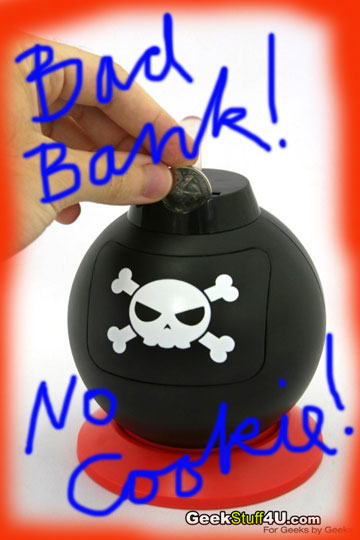
Okay here’s the full story I mentioned earlier in brief.
California Attorney General Jerry Brown announced this morning that he had filed suit against three Wells Fargo affiliates to recover $1.5 billion for California investors who purchased auction-rate securities based on “false and deceptive” advice that these financial instruments were “as safe and liquid as cash.”
Here’s the deal according to Jerry’s press release:
“Wells Fargo’s affiliates promised investors auction-rate securities were as safe and liquid as cash, when in fact they were not, and now investors are unable to get their money when they need it,” Attorney General Brown said. “This lawsuit seeks to recover $1.5 billion for Californians and holds these companies accountable for giving investors false and deceptive advice.”
Auction-rate securities are investments with long-term maturity dates (e.g., bonds) that Wells Fargo and other banks marketed as short-term investments equivalent to cash. These investments paid a slightly better rate of return than a bank account. And, investors could sell the securities at regular weekly or monthly auctions which provided the promise of liquidity.
In February 2008, these auctions froze up nationwide, and investors were no longer able to redeem their securities for cash, as promised. This left approximately 2,400 Californians who had invested with Wells Fargo without access to more than $1.5 billion. Almost 40% of Wells Fargo’s auction-rate securities were held by Californians, far more than any other state nationwide.
In total, 5,687 investors purchased $2.9 billion worth of auction-rate securities from these companies nationwide.By August 2008, major financial institutions including UBS, Citigroup, Wachovia, and Merrill Lynch met their obligations to investors and restored the cash value of these securities. The three Wells Fargo affiliates, however, have refused to do so.

Now that the government has their hands in the banks, we still see the banks cooking the books more than ever. Dishonest reporting from financial institutions hasn’t improved with government running the show.
Blow hard, Woody ! Blow hard !!!
(Mr “Mark-to-whatever-the-CFO-pulls-out-of-his-butt” speaks…Thank God TurboTax doesn’t whine and expel rightwing gas.)
Turbo Tax – What Geithner falsely blamed for his tax fraud.
reg, you understand so little about accounting and finance, why don’t you drop your pretentiousness and quit spouting left-wing talking points fed to you? When you fail miserably at that, then you resort to personal attacks, which are boring to everyone and adds nothing to the discussion.
– – –
Congress hijacked accounting standards
– – –
Kaufman, Rossin & Co:
– – –
Financial Post
Bank lobbyists and politicians are damaging the credibility of corporate reporting and hurting the interests of investors around the world by pulling back on mark-to-market accounting, one of the world’s top international accountants warned.
The comments from Tom Jones, vice-chair of the International Accounting Standards Board (IASB), come after U.S. standard-setters unilaterally decided to dilute the controversial accounting rule earlier this month.
In an interview with the Financial Post, Mr. Jones warned of “a loss of credibility” and said the rationale for watering down so-called fair value accounting is “crazy.” He also cited concerns about political interference that could undermine the independence of accounting rule setters.
In early April, the U.S. Financial Accounting Standards Board pledged to backtrack on fair value accounting under intense pressure from Wall Street and demands from Congress. U.S. lawmakers had even threatened to take the matter into their own hands rather than leave it to the accountants. The resulting FASB rule changes allow banks to use judgment rather than market prices, to value financial instruments.
Nouriel Roubini, the New York University economist nicknamed “Dr. Doom” for his prescient forecast of the global economic downturn, yesterday called the U.S. rule changes “a big mistake” that has allowed Wall Street banks to “fudge” their latest set of quarterly accounts.
Proponents of fair value, or mark-to-market, accounting say it is the most accurate and independent way to price assets. But bankers say fair value accounting has exacerbated the current financial crisis by unfairly forcing them to take huge writedowns. They say illiquid markets for certain securities have led to fire sale prices that do not represent appropriate valuations, and they have lobbied to be allowed to value certain troubled securities based on their own estimates.
The idea that banks have been forced to write down assets beyond any rational level is “actually crazy,” said IASB’s Mr. Jones. The market price for troubled financial instruments has probably not even hit the bottom yet, he added.
– – –
Accounting Today
– – –
AP
“Our reaction is that this decision decreases transparency and allows financial institutions to use fictional valuations on many of their toxic assets,” Joshua Shapiro, chief U.S. economist at MFR Inc., said Thursday in a research note. “Whatever ‘write-ups’ result from this are unlikely to be valued very highly by markets, and this decision further obscures the true position of banks and other financial institutions.”
An estimated $2 trillion in soured assets is gumming up banks’ books.
“Banks need to have flexibility” in valuing assets but the fair market rule shouldn’t be scrapped, Sheila Bair, the chairman of the Federal Deposit Insurance Corp., told a gathering of bank executives Wednesday. “There needs to be integrity in those bank balance sheets.”
– – –
You can thank the Democrats for this.
Suck on that.
Yeah, reg, I didn’t think that you could come up with an intelligent comeback to that.